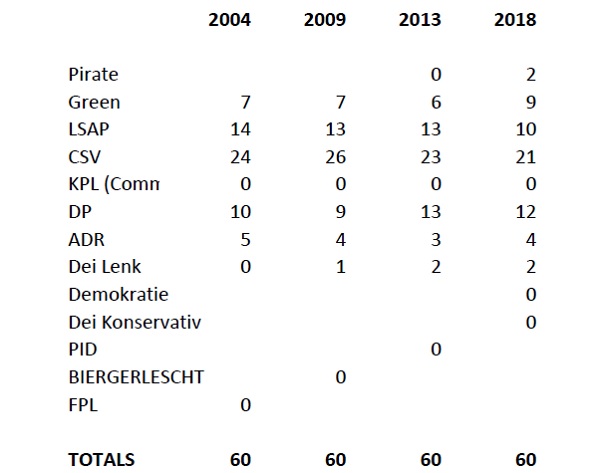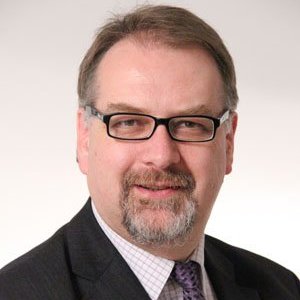
As reported recently on Chronicle.lu, the top candidates from the four main political parties for the 8 October 2023 national election are (in alphabetic order): Xavier Bettel (DP), Luc Frieden (CSV), Paulette Lenert (LSAP) and Sam Tanson (Green).
In looking back at the last few national elections in the Grand Duchy, we can see some trends.
Firstly, just because one is the most popular politician in the country, and they receive most votes (we must remember here that not all politicians stand for election in the same constituency), does not mean that they then become Prime Minister. No, not at all. While Jean-Claude Juncker topped the polls in both the 2004 and 2009 general elections (with 65,378 and 67,082 combined votes), his party was the largest with 24 and 26 seats respectively and went into power in coalition governments with the LSAP both times and Jean Asselborn (the 3rd most popular politician in 2004 with 36,443 votes, and the 2nd most popular in 2009 with 42,797 combined votes) the Deputy Prime Minister.
With a total of 60 seats in parliament, the magic number is therefore 31: as no one party has managed to cross this threshold in recent years, Luxembourg has traditionally entertained a coalition government, with the DP, LSAP and Greens forming the current and previous governments, with the CSV and LSAP for two terms before that.
Here is a look at the main individuals, and personalities, in the four main political parties in Luxembourg:
CSV
In these years, Luc Frieden (CSV) won 41,908 votes in 2004 (2nd most popular) and 41,889 in 2009. When Juncker did not stand in the 2013 election, Frieden's votes dropped to 29,441. He did not stand in 2018. Over the same timeline, Claude Wiseler's votes have been relatively stable at 26,009 (2004), 31,649 (2009), 25,590 (2013) and 27,388 (2018). Basically, nobody took over Jean-Claude Juncker's votes, and his popularity.
DP
Lydie Polfer (currently Mayor of Luxembourg City, again) has lost votes since her heyday in 2004 (28,206); however, since then, her popularity has remained stable, with 16,402 (2009), 18,627 (2013) and 18,934 (2019). During this period, the popularity of her protégé, Xavier Bettel, has risen to become the second most popular politician in the Grand Duchy (behind Jean Asselborn of the LSAP): Bettel's combined votes of 12,069 (2004), 19,671 (2009), 32,064 (2013) and 30,774 (2018) show that he was arguably the main beneficiary of Jean-Claude Juncker withdrawing from national politics for the 2013 election. It is also interesting to see that Corinne Cahen, who first stood in 2013, gaining 13,822 combined votes, increased her vote to 19,471 in the 2018 election.
LSAP
While Jean Asselborn received his highest-ever vote count in 2009 (42,797 combined votes, up from 36,443 in 2004), he has received the most number of votes in both the 2013 (38,257 combined votes) and 2018 (40,283) elections, with Xavier Bettel (DP) the second most popular both times. Paulette Lenert (whose popularity soared for her handling of the pandemic as Minister for Health) has never stood for election nationally, while Jeannot Krecké (19,391 comined votes in 2004; 25,650 in 2009) did not stand in 2013. Instead, Etienne Schneider did, gaining 19,682 votes in 2013 and 16,872 in 2013; however, he resigned from government in 2020 and is not standing this time round.
Green Party
François Bausch has flown the green flag for three elections, gaining 17,510 combined votes in 2009, 11,598 in 2013 and 19,889 in 2018. Sam Tanson's popularity has increased significantly, from 5,713 combined votes in 2009 to 7,867 in 2013 and 17,290 in 2018.
The Big Questions
The big question heading into October's general election is therefore: presuming most politicians' votes do not change drastically from the 2018 election, how will the return of Luc Frieden of the CSV affect the outcome?
Also, will this help the CSV to claw back some of the seats they have lost in the last two elections? And will the LSAP recover some of the seats they lost last time out?
Even so, will the CSV be able to prise away one of the three current coalition partners, with which to go to the Grand Duke and result in Luc Frieden becoming the next Prime Minister?
There is a saying that "a week is a long time in politics": there are around 34 weeks to go to the general election. Maybe the local elections on 11 June will give some indication as to which way the national election will go?
* combined votes = first-preference votes, plus transfers









